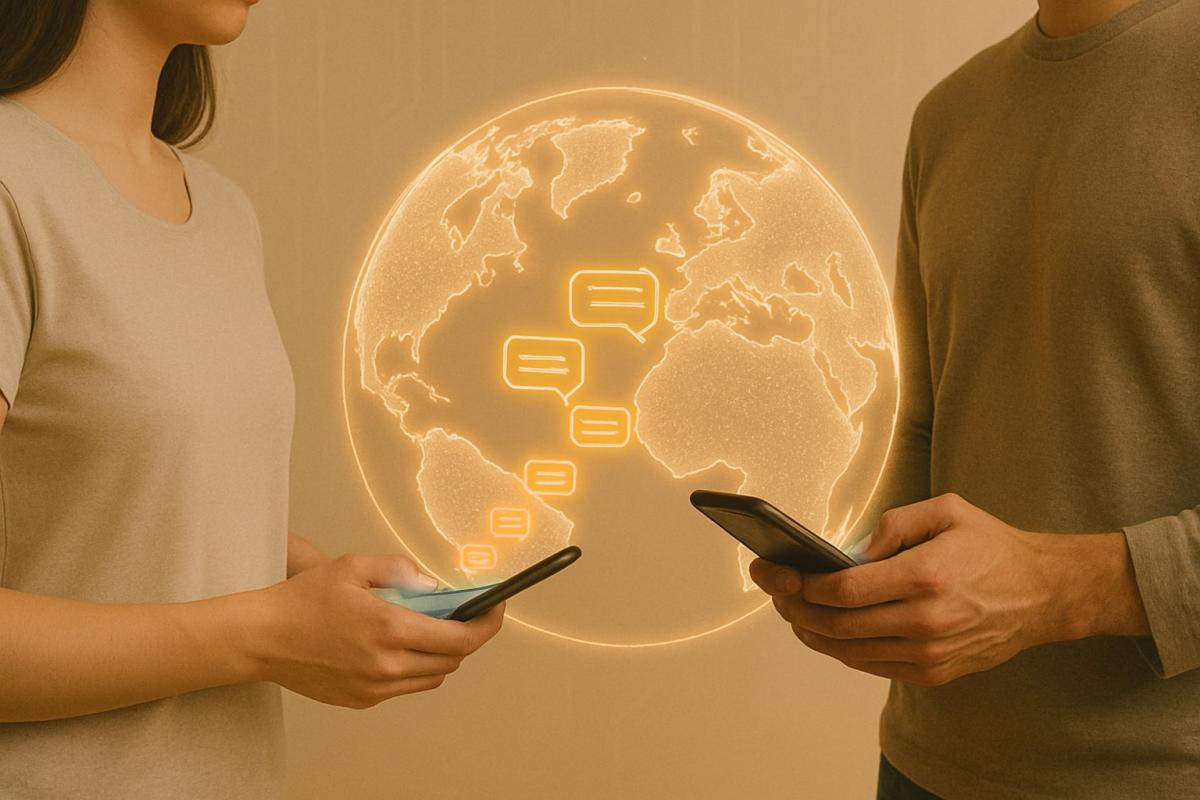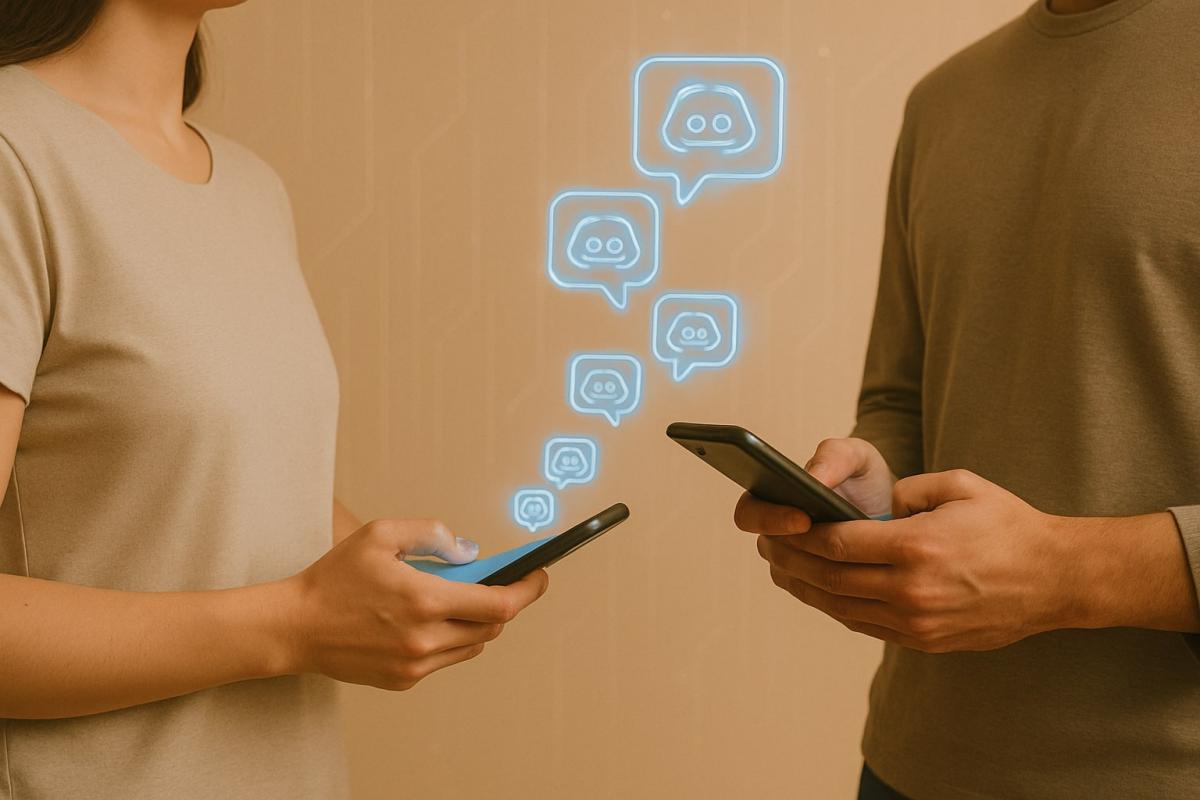How the internet shapes interpersonal relationships: from online dating to digital friendships
The internet has changed how we find love and friends. From Tinder to Instagram, it connects people through screens but also brings challenges and risks, including superficial relationships or fake profiles. Let's explore together how the online world is changing our relationships, what it gives us and what it takes away, and take a look at what the future holds with virtual reality.

Love at first click, friendships through a screen – the internet has given us the chance to connect with anyone, anywhere. But behind the gloss of social networks and dating apps lurk shadows: superficial relationships or fake identities. Discover with us how the digital world shapes our relationships.
Online dating: Love in minutes
The rise of dating apps
Dating apps like Tinder, Bumble, or the Czech Badoo have changed the way people look for love. We are no longer limited to meeting in a café or at a party – all it takes is a smartphone and a little time.
Statistics show that in 2024, over 300 million people worldwide used online dating platforms. Most available platforms allow filtering of potential partners by interests, age, or location, which saves time but also changes the dynamics of relationship building.
Benefits and pitfalls of digital romance
Online dating brings freedom and accessibility. People who would otherwise never meet have a chance to connect. Introverts or those living in remote areas gain new opportunities. On the other hand, the speed and quantity of contacts can lead to superficiality.
This brings us to the phenomenon of the “swipe culture,” which often reduces people to photos and short descriptions, making it challenging to form deeper emotional connections. Additionally, some users face the “paradox of choice” – too many options leading to indecisiveness.
Once you manage to catch someone, the hard reality hits, where you have to move into the offline world. Fortunately, studies show that couples who met online have a similar chance of long-term relationships as those who met through traditional means.

Digital friendships: Connections through screens
Social networks as bridges between people
Social networks like Facebook, Instagram, or Discord allow maintaining friendships at a distance. People who relocated due to work, study, or life changes can stay in touch with friends and family. Moreover, groups on social networks connect people with the same interests – whether they are book, game, or travel enthusiasts.
Virtual friendships are thriving
Digital friendships, however, face challenges. Communication through text messages or video calls lacks non-verbal elements like voice tone or body language, which can lead to misunderstandings. On the other hand, the online environment allows people to be more open, as anonymity or distance often reduces their fear of judgment. For example, gaming communities on platforms like Twitch or Discord often form strong bonds among people who have never physically met.
Risks of isolation
Even though the internet facilitates connections, it can paradoxically contribute to feelings of loneliness. People spend hours on social networks, but superficial interactions, like “likes” or short comments, may not replace actual human contact. Research supports this, suggesting that excessive social network use can increase feelings of anxiety, especially among the younger generation.
New forms of communication: Emojis, memes, and gifs
The internet has introduced new ways of expressing emotions. Emojis, gifs, and memes have become a universal language that transcends language barriers. For instance, a simple smiley face can express joy, sadness, or irony faster than words. While enriching communication, they can also distort complex emotions, sometimes leading to misunderstandings.
Memes also contribute to communication, becoming a phenomenon across cultures. A simple share of a funny meme can strengthen friendships or create a sense of belonging in online communities. However, the fast-paced and consumable nature of these interactions may distract from deeper communication and understanding.

Challenges of the digital age: Trust and authenticity
One of the biggest risks of online relationships is the lack of trust. This is exemplified in the phenomenon of “catfishing,” where someone creates a fake identity. People may pretend to be someone else to gain attention or manipulate others. This makes building trust difficult, especially in romantic relationships.
Another challenge is protecting personal data. Sharing information online can lead to abuse, whether it’s hacking accounts or publicizing private messages. Unfortunately, the only protection is being cautious and knowing how to protect your privacy to avoid negative impacts.
The future of interpersonal relationships
The internet will continue to transform how we connect and maintain relationships. With the development of technologies like virtual reality or artificial intelligence, new possibilities for even more intense digital interactions open up. For instance, virtual worlds like the Metaverse promise environments where people can meet in realistic digital spaces.
Experts, however, stress the importance of finding a balance between the online and offline world. Although the internet facilitates connections, real relationships require time, effort, and especially personal contact. The key is to use technology as a tool that helps us, not one that replaces human interaction.
Autonomous vehicles around the world: How close are we to regular driverless operation?

Cities around the world are seeing an increase in autonomous vehicles as part of their transportation systems. However, their reliability varies significantly by region. We will explore where this technology is already commonly transporting passengers and what autonomous driving means in practice today.
Introducing Auracast - the biggest advancement in Bluetooth listening in recent years

Listening to a movie or playlist on multiple headphones has always been difficult. Auracast offers the ability to play the same audio to multiple people without pairing or special accessories. It can be used at home with TV, on trips, and in places with poorly audible announcements. In the article, we will show how this innovation works in practice and when we will start encountering it regularly.
Lost signal? A satellite phone won't leave you disconnected

Losing signal in the middle of the mountains or on the open sea no longer has to mean a loss of connection to the world. A satellite phone works even where regular mobile networks end. In the article, you'll learn how the device connects via satellites, what types of networks exist, how much calls cost, and why satellite communication is becoming more accessible for ordinary users.
Leaked passwords: How to find out if someone has obtained your data

Data breaches happen all the time and can affect anyone. Even strong login credentials can appear in the database of leaked passwords circulating on the internet. In the article, you will learn how to perform a password check using verified tools and find out if someone has gained access to your accounts.
Internet via light or how does Li-Fi work?

With the growing number of connected devices and the increased volume of data being transmitted, new ways are being sought to speed up and improve network efficiency. Internet via light, referred to as Li-Fi technology, uses LED lighting for wireless data transmission and promises higher speed and greater security. Let's see how it works and where it's already being tested.
What will 6G internet bring – lightning-fast connection, smart cities, and artificial intelligence in the network

Mobile networks of the sixth generation will push the boundaries of communication and data transmission. 6G internet will offer speeds in the order of terabits, minimal delay, and integration with artificial intelligence. In the article, we explain how this technology works, how it differs from 5G, what frequencies it uses, and why it is essential for smart cities and modern industry.